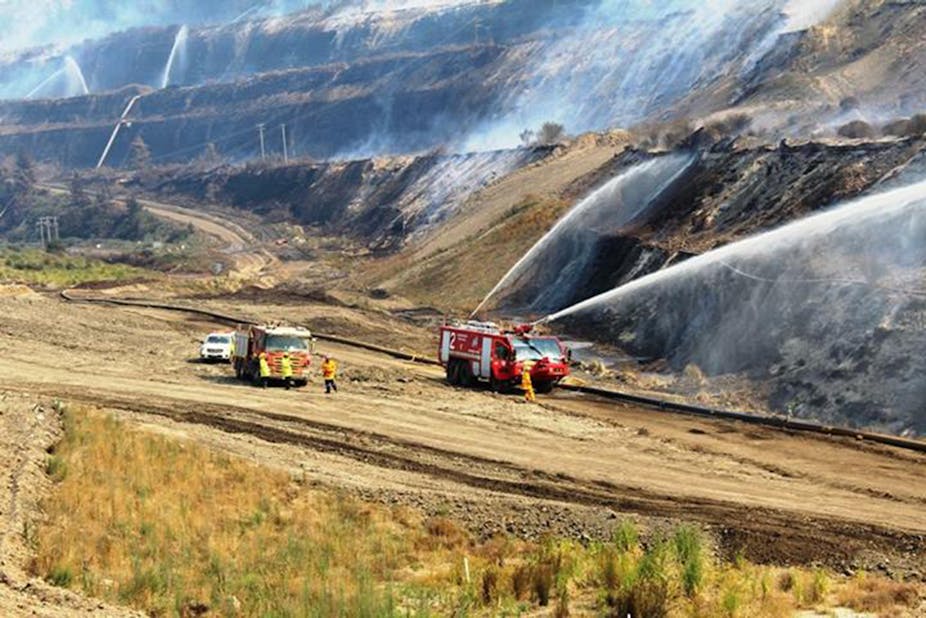Corporations are involved in every area of our lives. In our education, health, welfare and criminal justice systems, they are ever-present.
So obvious is this “fact” of life that it is often only in moments of crisis – such as the recent Hazelwood coal mine fire for the residents of Morwell – that we bother to question the consequences of corporate activity.
That said, and with no hint of irony, in the same week that the fire at Hazelwood was extinguished, the Abbott government announced its “red tape bonfire”: 12 deregulation bills, to be rolled out through the autumn, all of which will further free business from its burdens of regulation.
Whose ‘burden’ is it?
The idea that regulation is a burden to be lessened is a mantra for politicians and a growing number of academics. But this ignores the weight of evidence that the significant burden of corporate activity is shouldered by the most vulnerable.
Combined World Health Organisation and International Labour Organisation data shows that more than one in eight deaths across the globe are the result of air pollution or working. Our research has shown that most deaths caused by working and air pollution are caused by corporate activity. This is a basic but very clear indicator of how profit is privatised and how the “burden” of risk is really distributed.
This should be the starting point for thinking about we regulate corporations, particularly in the wake of the Hazelwood fire. Carcinogenic air pollutants in Morwell have been estimated at 20 times the average level.
However, such facts are barely acknowledged by academics when they analyse and develop strategies of corporate regulation. We used to take it for granted that university researchers would be able to ask the most difficult, challenging and important questions. At the very least, they would expose political rhetoric when it is palpably nonsense.
There is a very large body of academic researchers – with the most influential based in Australia – who study corporate regulation. Their work tends to end up in obscure journals; much of it is funded by governments and corporations themselves; and it is used by policymakers to legitimate deregulation.
These researchers rarely stand alongside social movements that seek to challenge the dominant political agenda, which sees public protection as a “burden”.
The entrepreneurial university
The freedom to ask awkward questions about corporate – and, relatedly, state – power is increasingly subjected to a range of subtle and not-so-subtle controls.
Reliance on, or craving for, business and state funding for research makes it less rather than more likely that academics will ask why governments have failed to protect us from corporations. Academics are not just pushed to seek such funding: they are increasingly performance-measured by the extent to which they secure it.
Those pressures are driven by university managers obsessed with rankings tables, generating pressure to publish academic papers in a narrow band of “prestigious” journals at the expense of publishing for wider, non-academic audiences.
Meanwhile, 40-60% of all Australian university academics are on fixed-term, often short, contracts. The casualisation of employment within contemporary universities weakens the ability of academics to resist the entrepreneurial demands of management.
The net effect of these changes is that university researchers – nudged and cajoled into courting business – are less likely to open up the skills and resources of the university to those relatively powerless, vulnerable, disadvantaged groups in our societies.
They are also less likely to frame their research questions in line with the concerns and needs of these groups, and are less likely to make the fruits of their research freely available to groups outside the university.

Holding power to account
These observations raise certain key questions. Where might non-official knowledge that challenges our assumptions about corporate activities and who really shoulders the “burden” of these be generated?
How might this knowledge contribute to a debate about the more effective regulation of corporate activity and about greater state accountability for its collusion in the production of corporate harm?
And finally, how can academic work support those engaged in struggles for justice – such as the residents of Morwell, consistently reassured by government and corporation that they are in no danger from the airborne pollution caused by the fire?
However hostile the climate of the entrepreneurial university, those of us who work in academia enjoy relative privilege – some much more than others. We have access to resources which most other workers simply do not enjoy. This entails a responsibility to put those resources to work in a genuinely critical way which aspires to further social justice.
As the fallout from Hazelwood unfolds, whatever the inquiry uncovers, we can be certain of one thing. A critical scrutiny of the history of the mine, its privatisation, the licensing and regulation regime, and the nature of the response to the fire would all shed some light on the murky world of state-corporate relationships, where power and profit collide and collude.
We can also be sure that both the government and the owners, GDF Suez, will do all they can to ensure that business-as-usual proceeds, protected by the state, even as it claims legitimacy in the name of protecting workers and the public.
It is the role of academic researchers to challenge the political rhetoric and the collusive relationships between government and corporations that allow workers, communities and the environment to be endangered. We can only do this by aligning ourselves more closely with the social movements and campaigns fighting for social justice, rather than with governments, politicians and corporations.
The authors will be presenting the Monash University Criminological Horizons public lecture on April 15.

